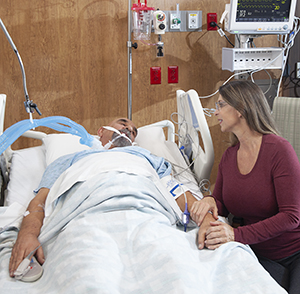Surgery for a Brain Aneurysm: Hospital Recovery
After surgery for a brain aneurysm, you may spend 1 to 4 weeks in the hospital. The stay depends on the amount of damage caused by the aneurysm, your overall health, and your response to treatment and therapy. Your healthcare team will monitor how well treatment has worked. Then they will decide how long you need to be in the hospital and whether you need rehabilitation.
In the ICU
Your loved ones may visit you in the ICU (intensive care unit) . You may be attached to many devices to help with your breathing and to monitor pressure on your brain, any new bleeding, narrowing of your blood vessels (vasospasm), and general body functions. Special devices may be used to help maintain blood flow in your legs. After open surgery, your head may be bandaged. After an endovascular procedure, you will need to lie still for several hours. Once stable, you will be moved to a regular hospital room.

Evaluating the outcome
Follow-up tests may be done 3 to 5 days after treatment to show how well the treatment worked. They may also reveal new problems. An arteriogram shows an image of a treated aneurysm. A Doppler test may be done daily to check for narrowing of your blood vessels. A CT scan shows any bleeding, vasospasm, stroke, or swelling in your brain that may occur after treatment. In some cases, you may have an MRI. This is another type of scan that can give detailed images of brain tissue and blood vessels.
As healing begins
At first, you may be on a liquid diet. As your body recovers, you can start eating solid foods. Your ability to swallow, move about, and perform other functions will be checked. You will also learn breathing exercises. These will help your body recover from surgery.
Working toward recovery
You may have trouble moving your arms or legs, talking, or understanding language. If so, you may need rehabilitation. Special therapists will work with you to help improve your balance, strength, speech, and daily living skills. A therapist may suggest equipment that can help you move about at home.
Online Medical Reviewer:
Heather M Trevino BSN RNC
Online Medical Reviewer:
Mahammad Juber MD
Online Medical Reviewer:
Marianne Fraser MSN RN
Date Last Reviewed:
4/1/2024
© 2000-2024 The StayWell Company, LLC. All rights reserved. This information is not intended as a substitute for professional medical care. Always follow your healthcare professional's instructions.